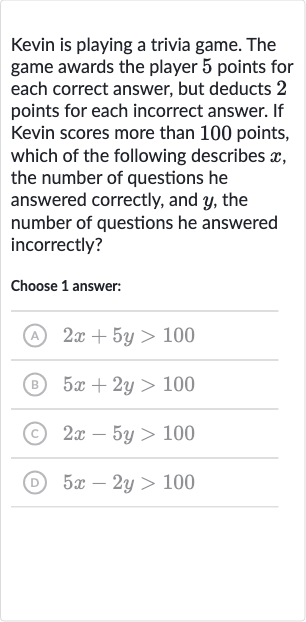AI tutor
Welcome to Bytelearn!
Let’s check out your problem:

Kevin is playing a trivia game. The game awards the player points for each correct answer, but deducts points for each incorrect answer. If Kevin scores more than points, which of the following describes , the number of questions he answered correctly, and , the number of questions he answered incorrectly?Choose answer:(A) 2 x+5 y>100 (B) 5 x+2 y>100 (C) 2 x-5 y>100 (D) 5 x-2 y>100
Full solution
Q. Kevin is playing a trivia game. The game awards the player points for each correct answer, but deducts points for each incorrect answer. If Kevin scores more than points, which of the following describes , the number of questions he answered correctly, and , the number of questions he answered incorrectly?Choose answer:(A) (B) (C) (D)
- Given Information: We are given that Kevin earns points for each correct answer and loses points for each incorrect answer. To represent the total score, we multiply the number of correct answers by and the number of incorrect answers by . The total score is then .
- Inequality for Total Score: Since Kevin needs to score more than points, the inequality representing this situation would be his total score being greater than . Therefore, the inequality is 5x - 2y > 100.
- Matching the Inequality: We now match our derived inequality with the given choices. The correct inequality that matches our derived inequality is (D) 5x - 2y > 100.
More problems from Counting principle
QuestionGet tutor help
QuestionGet tutor help
QuestionGet tutor help
QuestionGet tutor help
QuestionGet tutor help
QuestionGet tutor help
QuestionGet tutor help
QuestionGet tutor help
QuestionGet tutor help
